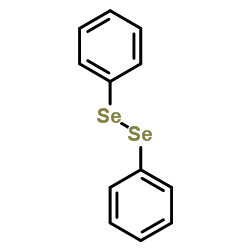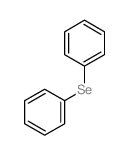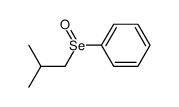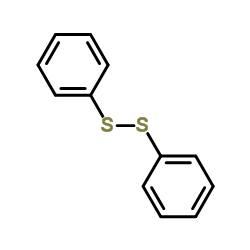benzeneseleninic anhydride
Modify Date: 2025-08-21 11:08:17

benzeneseleninic anhydride structure
|
Common Name | benzeneseleninic anhydride | ||
|---|---|---|---|---|
| CAS Number | 17697-12-0 | Molecular Weight | 360.12600 | |
| Density | N/A | Boiling Point | 184.2ºC at 760 mmHg | |
| Molecular Formula | C12H10O3Se2 | Melting Point | 165-170 °C(lit.) | |
| MSDS | N/A | Flash Point | 65.2ºC | |
| Name | phenylseleninyl benzeneseleninate |
|---|---|
| Synonym | More Synonyms |
| Boiling Point | 184.2ºC at 760 mmHg |
|---|---|
| Melting Point | 165-170 °C(lit.) |
| Molecular Formula | C12H10O3Se2 |
| Molecular Weight | 360.12600 |
| Flash Point | 65.2ºC |
| Exact Mass | 361.89600 |
| PSA | 43.37000 |
| LogP | 0.65480 |
| Vapour Pressure | 1.02mmHg at 25°C |
| InChIKey | FHPZOWOEILXXBD-UHFFFAOYSA-N |
| SMILES | O=[Se](O[Se](=O)c1ccccc1)c1ccccc1 |
Synonym: None SECTION 2 - COMPOSITION, INFORMATION ON INGREDIENTS
Risk Phrases: 23/25 33 SECTION 3 - HAZARDS IDENTIFICATION EMERGENCY OVERVIEW Toxic by inhalation and if swallowed. Danger of cumulative effects.The toxicological properties of this material have not been fully investigated.Moisture sensitive. Potential Health Effects Eye: May cause eye irritation. Skin: No information regarding skin irritation and other potential effects was found.
Ingestion: The toxicological properties of this substance have not been fully investigated. Inhalation: The toxicological properties of this substance have not been fully investigated. Chronic: No information found. SECTION 4 - FIRST AID MEASURES Eyes: Immediately flush eyes with plenty of water for at least 15 minutes, occasionally lifting the upper and lower eyelids. Get medical aid immediately. Skin: Get medical aid. Flush skin with plenty of soap and water. Ingestion: If victim is conscious and alert, give 2-4 cupfuls of milk or water. Get medical aid immediately. Wash mouth out with water. Inhalation: Get medical aid immediately. Remove from exposure and move to fresh air immediately. If not breathing, give artificial respiration. If breathing is difficult, give oxygen. Notes to Physician: SECTION 5 - FIRE FIGHTING MEASURES General Information: As in any fire, wear a self-contained breathing apparatus in pressure-demand, MSHA/NIOSH (approved or equivalent), and full protective gear. Extinguishing Media: Use water spray, dry chemical, carbon dioxide, or chemical foam. SECTION 6 - ACCIDENTAL RELEASE MEASURES General Information: Use proper personal protective equipment as indicated in Section 8. Spills/Leaks: Vacuum or sweep up material and place into a suitable disposal container. Avoid generating dusty conditions. SECTION 7 - HANDLING and STORAGE Handling: Wash thoroughly after handling. Avoid contact with skin and eyes. Avoid ingestion and inhalation. Use only in a chemical fume hood. Storage: Store in a cool, dry place. Store in a tightly closed container. SECTION 8 - EXPOSURE CONTROLS, PERSONAL PROTECTION Engineering Controls: Use adequate ventilation to keep airborne concentrations low. Exposure Limits CAS# 17697-12-0: United Kingdom, WEL - TWA: (listed as selenium compounds): 0.1 mg TWA (except hydrogen selenide, as Se) United Kingdom, WEL - STEL: (listed as selenium compounds): 0.3 m STEL (except hydrogen selenide, as Se) United States OSHA: 0.2 mg/m3 TWA (as Se) (listed under Selenium compounds). Belgium - TWA: (listed as selenium compounds): 0.2 mg/m3 VLE (as Japan: (listed as selenium compounds): 0.1 mg/m3 OEL (except SeH2 SeF6, as Se) Malaysia: (listed as selenium compounds): 0.2 mg/m3 TWA (as Se) Netherlands: (listed as selenium compounds): 0.1 mg/m3 MAC (as Se Spain: (listed as selenium compounds): 0.1 mg/m3 VLA-ED (except hydrogen selenide, as Se) Personal Protective Equipment Eyes: Wear appropriate protective eyeglasses or chemical safety goggles as described by OSHA's eye and face protection regulations in 29 CFR 1910.133 or European Standard EN166. Skin: Wear appropriate protective gloves to prevent skin exposure. Clothing: Wear appropriate protective clothing to prevent skin exposure. Respirators: Follow the OSHA respirator regulations found in 29 CFR 1910.134 or European Standard EN 149. Use a NIOSH/MSHA or European Standard EN 149 approved respirator if exposure limits are exceeded or if irritation or other symptoms are experienced. SECTION 9 - PHYSICAL AND CHEMICAL PROPERTIES Physical State: Solid Color: almost white Odor: Not available. pH: Not available. Vapor Pressure: Not available. Viscosity: Not available. Boiling Point: Not available. Freezing/Melting Point: 170 - 173 deg C Autoignition Temperature: Not available. Flash Point: Not available. Explosion Limits, lower: Not available. Explosion Limits, upper: Not available. Decomposition Temperature: Solubility in water: Specific Gravity/Density: Molecular Formula: C12H10O3Se2 Molecular Weight: 360.13 SECTION 10 - STABILITY AND REACTIVITY Chemical Stability: Not available. Conditions to Avoid: Incompatible materials, exposure to moist air or water. Incompatibilities with Other Materials: Bases - oxidizing agents - metals. Hazardous Decomposition Products: Carbon monoxide, carbon dioxide, selenium/selenium oxides. Hazardous Polymerization: Has not been reported. SECTION 11 - TOXICOLOGICAL INFORMATION RTECS#: CAS# 17697-12-0 unlisted. LD50/LC50: Not available. Carcinogenicity: BENZENESELENINIC ANHYDRIDE - Not listed by ACGIH, IARC, or NTP. SECTION 12 - ECOLOGICAL INFORMATION SECTION 13 - DISPOSAL CONSIDERATIONS Dispose of in a manner consistent with federal, state, and local regulations. SECTION 14 - TRANSPORT INFORMATION IATA Shipping Name: SELENIUM COMPOUND, N.O.S. Hazard Class: 6.1 UN Number: 3283 Packing Group: II IMO Shipping Name: SELENIUM COMPOUND, N.O.S. Hazard Class: 6.1 UN Number: 3283 Packing Group: II RID/ADR Shipping Name: SELENIUM COMPOUND, N.O.S. Hazard Class: 6.1 UN Number: 3283 Packing group: II SECTION 15 - REGULATORY INFORMATION European/International Regulations European Labeling in Accordance with EC Directives Hazard Symbols: T Risk Phrases: R 23/25 Toxic by inhalation and if swallowed. R 33 Danger of cumulative effects. Safety Phrases: S 20/21 When using do not eat, drink or smoke. S 28A After contact with skin, wash immediately with plenty of water. S 45 In case of accident or if you feel unwell, seek medical advice immediately (show the label where possible). WGK (Water Danger/Protection) CAS# 17697-12-0: No information available. Canada None of the chemicals in this product are listed on the DSL/NDSL list. CAS# 17697-12-0 is not listed on Canada's Ingredient Disclosure List. US FEDERAL TSCA CAS# 17697-12-0 is not listed on the TSCA inventory. It is for research and development use only. SECTION 16 - ADDITIONAL INFORMATION MSDS Creation Date: 9/02/1997 Revision #2 Date: 3/18/2003 The information above is believed to be accurate and represents the best information currently available to us. However, we make no warranty of merchantability or any other warranty, express or implied, with respect to such information, and we assume no liability resulting from its use. Users should make their own investigations to determine the suitability of the information for their particular purposes. In no way shall the company be liable for any claims, losses, or damages of any third party or for lost profits or any special, indirect, incidental, consequential or exemplary damages, howsoever arising, even if the company has been advised of the possibility of such damages. SECTION 16 - ADDITIONAL INFORMATION N/A |
| Hazard Codes | T:Toxic;N:Dangerousfortheenvironment; |
|---|---|
| Risk Phrases | R23/25;R33;R50/53 |
| Safety Phrases | S20/21-S28-S45-S60-S61 |
| RIDADR | UN 3283 6.1/PG 2 |
| WGK Germany | 3 |
| Packaging Group | III |
| Hazard Class | 6.1 |
| HS Code | 2916399090 |
| Precursor 2 | |
|---|---|
| DownStream 10 | |
| HS Code | 2916399090 |
|---|---|
| Summary | 2916399090 other aromatic monocarboxylic acids, their anhydrides, halides, peroxides, peroxyacids and their derivatives VAT:17.0% Tax rebate rate:9.0% Supervision conditions:none MFN tariff:6.5% General tariff:30.0% |
| phenylseleninic anhydride |
| benzeneselenic acid anhydride |
| Benzeneseleninic acid anhydride |
| Bis(phenylseleninic) anhydride |
| EINECS 241-701-3 |
| Benzeneseleninic anhydride |
| benzeneselenic anhydride |
| [PhSe(O)]2O |
| MFCD00001991 |
 CAS#:1666-13-3
CAS#:1666-13-3 CAS#:6996-92-5
CAS#:6996-92-5 CAS#:112238-64-9
CAS#:112238-64-9 CAS#:1132-39-4
CAS#:1132-39-4 CAS#:6343-83-5
CAS#:6343-83-5 CAS#:98-95-3
CAS#:98-95-3 CAS#:22233-90-5
CAS#:22233-90-5 CAS#:108-94-1
CAS#:108-94-1 CAS#:65275-36-7
CAS#:65275-36-7 CAS#:882-33-7
CAS#:882-33-7 CAS#:50984-16-2
CAS#:50984-16-2